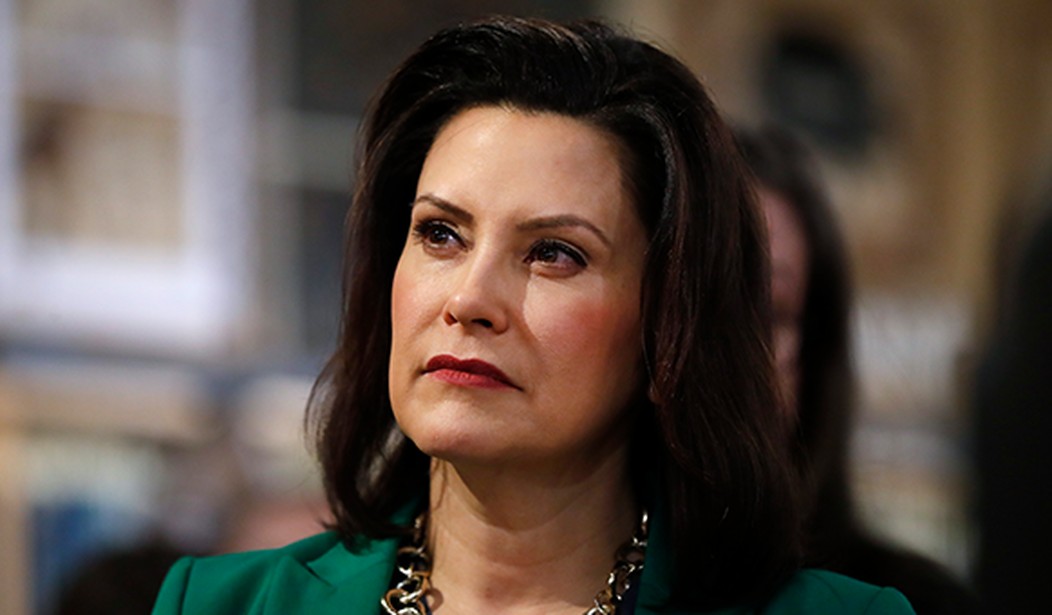If you want to see the difference in how President Trump and the Democrats handle the coronavirus, you don’t have to look any further than Michigan Governor Gretchen Whitmer. She is the new Democratic star who recently gave her party’s response to Trump’s State of the Union address.
On Friday, Whitmer became the point person for Democrat attacks on Trump’s handling of the crisis. She alleged, without providing evidence, that the Trump administration was causing medical supply vendors “not to send stuff here to Michigan.” She also attacked the administration for not giving “clear directives and guidance.” Trump responded on Friday night by tweeting that she “likes blaming everyone for her own ineptitude.”
Take one massive difference in their approaches. Trump uses his emergency powers to enable off-label use of drugs to fight the virus, while Whitmer has taken the opposite approach.
We know these drugs are safe since we use them for treating other illnesses. They just haven’t yet been proven effective against the coronavirus. But a March 24th letter from the Whitmer administration warns physicians and pharmacists that they risk losing their professional licenses if they prescribe drugs such as hydroxychloroquine. This drug shows real promise in small studies, but has yet to go through the years-long testing process that the FDA requires to prove efficacy.
As Trump said at his press conference on Friday, if someone is dying anyway from the coronavirus and we know that there are no significant side effects from hydroxychloroquine, what do we have to lose from giving it a try? We may also learn something about the treatment that could redound to the benefit of others.
While Trump has slashed government regulations, such as restrictions that prevented university hospitals from developing tests for the virus, there doesn’t appear to be a single regulation that Whitmer or any other prominent Democrat proposes scrapping. To them, only more regulation is the answer.
Recommended
There may not be any zombie apocalypse in store for Americans, but people have real concerns about the limitations of police protection amidst a pandemic. As of last Thursday, a fifth of Detroit’s police force was quarantined and not able to do its job. Twenty-five officers, including Police Chief James Craig, have tested positive for the disease
Telecommuting isn’t an option for police, and their jobs are now even more dangerous than usual. Many departments, including Detroit’s, have understandably scaled back policing in an effort to limit officers’ potential exposure to the disease. Police also have their hands full with enforcing their state’s stay-in-place lockdown.
It is little wonder that sales of guns and ammunition have soared, and the Trump administration’s Department of Homeland Security declared that firearm retailers are essential and should not experience disruptions during the pandemic. By contrast, Whitmer is one of seven governors who closed down gun stores in her state. Michigan is also no longer issuing concealed handgun licenses
The risk of contagion is particularly high within the close quarters of prisons, so Michigan police are limiting the number of new arrests to avoid introducing infected inmates. inmates who are deemed to be at high risk of infection are also getting released early from jails and prisons. The inmate population of Oakland County jail plummeted from 1,282 on March 1st to 1,016 by March 26th. The Macomb County jail saw its inmate population fall by over 25 percent over the same period. Massive releases are occurring in other jails across the state and the country.
So Michigan police are stretched thin and not responding to calls, at the same time that criminals are being released early from prison. Gun control advocates such as Whitmer would typically tell people they should rely on the police for protection. But if shortages do get out of control or if police departments face further restrictions, what are people supposed to do to protect themselves? Whitmer doesn’t trust people to make the right decision for themselves and their families.
There is a systematic difference in Whitmer’s and Trump’s approaches. Trump is much more willing to trust individual doctors, patients, and citizens to make the right decisions. The government can help in times of crisis, but sometimes it also needs to get out of the way so that we can respond effectively and without bureaucrats overseeing our every move.
John R. Lott Jr. is the president of the Crime Prevention Research Center and the author, most recently, of “The War on Guns.”

























Join the conversation as a VIP Member